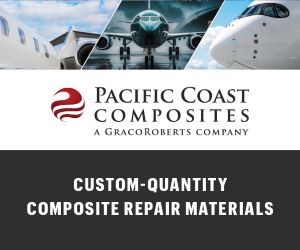IRT Jules Verne, Airbus and Fives launch MADRAS automated textile deposition line for WING project
Goal is full-scale testing of large, complex shape preforms at 5-6 times faster speeds for future aircraft.

The Jules Verne Institute for Technological Research (IRT, Bouguenais, France) has inaugurated the MADRAS automated production line for production of composite textile preforms at rates 5-6 times faster than existing technologies. The 18-meter-long pilot line, installed at the Technocampus Composites (Nantes, France), has been developed in a French national collaboration with Airbus (Toulouse), Fives (Paris) and Loiretech Machining (Bouguenais). It marks a key step in this consortium’s WING project, launched in April 2017.
With a budget of 5.6 million euros, WING aims to assess the ability of textile technology to meet the high production rates for large composite structures with complex geometry for future aircraft. Research areas include preform architecture, tooling concepts and automated production lines. The challenge is to produce such parts at a cost compatible with the economic constraints of the industry.
MADRAS line
The MADRAS pilot line is divided into three robotic stations dedicated to draping, fast preforming and fiber placement. The goal is to eventually reach a deposit rate of 150 kilograms/hour or 300 millimeters/second, and to prove the technical viability of this solution by a series of full-scale tests.
The automated machines developed by Fives must allow fiber reinforcement to be deposited at four times the width and thickness versus current equipment. Loiretech, for its part, has developed specific tools that drastically reduce preforming cycle times. Goals include not only increased production rates for aerospace and industrial sectors, but also reduced production waste, leading to reduced cost and a much improved environmental footprint across industries.
"This technology will interest all industrial sectors who work on small and large parts: traditional and renewable energy, but also the transportation industry overall, whether aerospace, automotive or shipbuilding," explained Marie Weiss, IRT Jules Verne project manager.
For more details, see “With Madras, Airbus and IRT Jules Verne take composites to high speed” by Alexandre Couto at industri-techno.com.
Related Content
-
Materials & Processes: Composites fibers and resins
Compared to legacy materials like steel, aluminum, iron and titanium, composites are still coming of age, and only just now are being better understood by design and manufacturing engineers. However, composites’ physical properties — combined with unbeatable light weight — make them undeniably attractive.
-
Plant tour: Joby Aviation, Marina, Calif., U.S.
As the advanced air mobility market begins to take shape, market leader Joby Aviation works to industrialize composites manufacturing for its first-generation, composites-intensive, all-electric air taxi.
-
Cycling forward with bike frame materials and processes
Fine-tuning of conventional materials and processes characterizes today’s CFRP bicycle frame manufacturing, whether in the large factories of Asia or at reshored facilities in North America and Europe. Thermoplastic resins and automated processes are on the horizon, though likely years away from high-volume production levels.
















